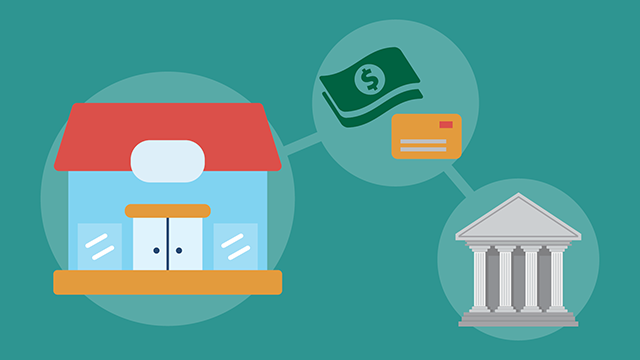The Ultimate Guide to Comprehending Pre Approval Student Loans
The Ultimate Guide to Comprehending Pre Approval Student Loans
Blog Article
The Role of Credit History in Securing Small Organization Loans for Entrepreneurs
In the affordable landscape of entrepreneurship, securing a small service car loan usually pivots on the critical element of credit rating scores. A higher credit report rating can open up doors to beneficial funding problems, while a reduced rating might offer substantial obstacles.
Recognizing Credit Rating
Credit history are essential numerical representations of an individual's credit reliability, working as an essential consider monetary decision-making for loan providers. These scores are derived from an extensive analysis of a person's credit rating, including aspects such as repayment background, credit utilization, length of credit report, new charge account, and types of credit rating used. Generally varying from 300 to 850, higher ratings represent reduced danger to lenders, while reduced scores show higher threat.
The computation of credit rating is accomplished by credit scores bureaus making use of proprietary formulas, with the most extensively recognized versions being FICO and VantageScore. Each design might weigh elements slightly in different ways, however they all purpose to supply a regular measure of credit rating danger. A solid credit report reflects the person's reliability in managing financial obligation, making timely repayments, and preserving a healthy equilibrium in between credit history utilized and offered credit.
It is essential for individuals and entrepreneur to recognize their credit history, as these figures can have far-reaching implications beyond personal finance. Routinely checking one's debt record, fixing mistakes, and embracing sound economic habits can significantly boost credit history, thereby boosting the individual's total financial account and creditworthiness.
Value for Financing Approval
Recognizing one's credit rating score is fundamental, as it plays a significant role in the procedure of finance approval for little organizations. Lenders use credit rating ratings as a main statistics to evaluate the credit reliability of applicants. A strong credit rating suggests a history of accountable monetary behavior, suggesting to loan providers that the applicant is most likely to repay the finance promptly. As a result, a high credit history can significantly improve a business owner's chances of protecting a funding with desirable terms, consisting of reduced rate of interest and more versatile payment choices.
On the other hand, a low credit history may indicate potential threat, leading loan providers to either decline the lending application or enforce stricter problems. This makes it critical for business owners to be familiar with their credit history standing, as it directly influences their ability to accessibility resources. Credit rating ratings serve as a standard procedure that enables loan providers to enhance their decision-making procedure, guaranteeing performance and consistency. As small companies typically call for timely access to funds for growth and sustainability, keeping a durable credit rating becomes vital. Hence, understanding and managing one's credit history score is a vital element of planning for lending applications and accomplishing service success.
Factors Affecting Scores
Numerous variables add to the decision of a credit report, each playing a crucial function fit an individual's credit history profile. Among these, settlement background stands apart as the most influential, reflecting the timeliness and uniformity of financial obligation repayments. Lenders very closely scrutinize this aspect to analyze monetary reliability. In a similar way, the amounts owed, or credit history usage, dramatically effect scores. A high ratio of used credit history to available debt can suggest economic overextension, adversely influencing creditworthiness.
Size of credit rating additionally elements into credit rating calculations, with a longer credit scores background usually seen extra positively. This statistics gives understanding right into the person's lasting economic actions, supplying lending institutions a more comprehensive viewpoint on their credit rating administration abilities. Additionally, the sorts of credit report being used are taken into consideration, as a mix of credit rating accounts, such as revolving bank card and installment finances, can show the capability to manage different economic commitments.
Finally, current credit history inquiries may influence scores (pre approval student loans). Regular applications for brand-new debt can show economic distress, therefore negatively influencing the rating. Each of these aspects is critical in the detailed evaluation of a credit report rating, impacting a business owner's ability to safeguard a bank loan
Improving Your Credit History
Boosting one's credit rating belongs to supporting a garden; cautious focus to key areas can generate significant improvements. To start, making certain timely her latest blog repayments on all credit rating accounts is critical. Payment history makes up a significant section of a credit report; thus, establishing up automated pointers or repayments can weblink help maintain uniformity. In addition, reducing financial debt levels is vital. High credit application ratios, or the amount of credit history made use of about the debt limit, can negatively impact ratings. Objective to keep use below 30% of overall offered debt.

Lastly, preserving older credit rating accounts can favorably affect the ordinary age of credit history, which is an additional variable in scoring models. While new debt inquiries ought to be lessened to prevent temporary score dips, accountable credit rating management gradually will normally cause rack up enhancement, therefore boosting qualification for positive bank loan terms.
Alternate Financing Options
Navigating the world of small business funding often needs discovering different choices past standard bank fundings. Business owners with less-than-ideal credit history might locate these choices not just a lot more easily accessible however also customized to their one-of-a-kind service requirements. Among one of the most prominent options are online lending institutions, which have proliferated in recent times. These platforms usually offer much faster approval procedures and more flexible terms than standard banks, usually taking into consideration elements past credit rating, such as organization performance and capital.
An additional practical choice consists of crowdfunding, where business owners can raise capital from a big swimming pool of tiny investors through platforms like Kickstarter or Indiegogo. This technique not just gives funds yet likewise confirms business ideas through direct interaction with prospective clients. In addition, microloans, often provided by nonprofit organizations, deal with local business and startups. They provide smaller finance quantities with reduced rates of interest, making them suitable for business owners who need limited capital.
Invoice funding and vendor cash advances are additionally worth thinking about. The former entails offering exceptional invoices to great post to read a lending institution at a discount rate, while the last supplies a development on future sales. Both alternatives can enhance capital without the strict debt demands of traditional lendings.
Verdict

These scores are obtained from an extensive analysis of a person's credit rating history, encompassing facets such as repayment background, credit scores usage, length of credit report background, brand-new credit report accounts, and kinds of debt made use of (pre approval student loans). A solid credit rating mirrors the individual's dependability in handling debt, making timely repayments, and maintaining a healthy and balanced equilibrium in between credit rating made use of and offered credit score

Report this page